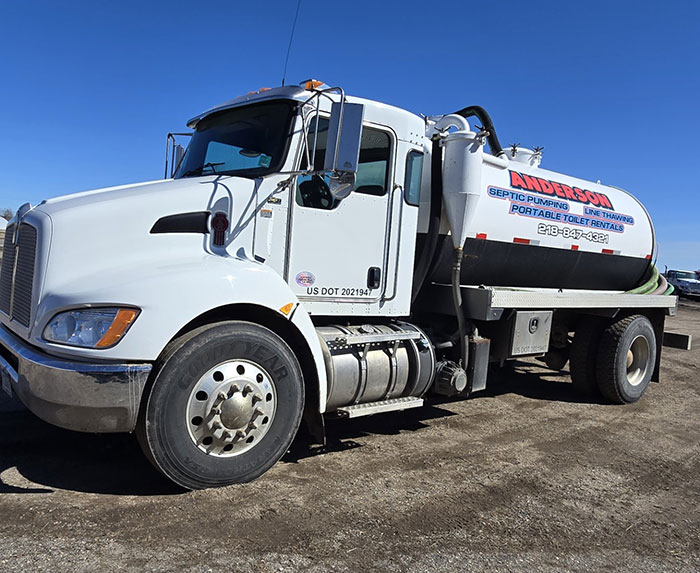Septic Pumping
Services Offered:
- Septic tank pumping
- Holding tank pumping
- Line thawing/jetting
FAQ’s
Here we will be featuring some of the questions you may have about your septic system.
We would like to hear from you if you have any questions we may have missed! Please email us at info@andersonpumpingandportables.com
Your septic tanks and systems are an investment you want to protect and take care of with proper care and septic tank pumping.
We encourage you to visit University of Minnesota for Septic System Owners for more detailed information about each topic.
How Often Should I Pump My Septic System?
Your septic tank must be cleaned or “pumped” periodically to remove the solids that accumulate in the tank.
How often you need to clean your septic tank depends on its size, the number of people using the system, and how careful you are about using it.
Once a system is operating properly, the tank should be cleaned every one to three years, never go more than three years between cleanings.
Septic Tank Frequency Guidelines
What can I do if I have a bad odor, sewage smell in my house?
One of the common reasons for having a sewage odor in your home is caused by having dry P-traps. Try pouring a quart of water in all the toilets and sinks in your home including your floor drains. If you still have an odor, please call a licensed, bonded and insured plumber so that they can check to see if it’s caused from leaks, rotted or cracked drain pipes, clogs in the drain, a bad wax ring on the toilet or a stopped-up vent pipe.
Can I Use Septic Tank Additives?
We highly discourage the use of any product intended to lessen the amount of accumulated solids in a septic tank in order to reduce the frequency of proper maintenance. It could potentially have an adverse effect on how a healthy system should function, leading to system failure.
What Can I Do To Help My System Function Properly?
The following are choices you can make to improve the performance of your septic system and protect your investment.
- When washing clothes or dishes, use the minimum amount of soap, detergent or bleach necessary to get the job done. Also use liquid detergents and soaps. If liquid detergents are undesirable, use highly biodegradable powdered detergents.
- Reuse laundry wash water with a suds-saver device on the automatic washer. The second load of clothes requires only a fraction of the soap and reuses the water.
- Consider a front loading or low water use washer when purchasing a new washer.
- Minimize the amount of hair, grease and food materials that go down your drains.
- Use minimal amounts of mild cleaners and only use as often as needed.
- Do not use “every flush” toilet bowl disinfectants. Reduce toilet bowl cleaner use by doing more scrubbing.
- Garbage disposals shouldn’t be used with septic systems.
- Vegetable, meat, fat, oil, and other food products add large amounts of sludge. A result is more frequent tank cleaning. These materials are difficult for bacteria in the septic tank to break down.
- Hazardous waste products should not be disposed of in a septic system. This includes even small amounts of latex paint rinsed off rollers or brushes.
- Dispose of all solvents, paints and chemicals through local recycling and hazardous waste channels. Consult local solid waste officials for proper methods. These materials kill valuable bacteria in the system.
- Unwanted medications should not be flushed down the toilet or poured down the drain. They will kill beneficial bacteria in the septic tank and drainfield.
- Do not flush facial tissue, paper towels, cigarette butts, disposable diapers or personal hygiene products.
Do Antibacterial or Disinfectant Products Destroy the Bacteria in my Septic Tank?
- The use of antibacterial or ‘disinfectant’ products in the home can and do destroy good and bad bacteria in the treatment system.
- Normal use amounts of these products will destroy some beneficial bacteria but the population will remain sufficient and recover quickly enough to not cause significant treatment problems.
- Excessive use of these products in the home can cause significant and even total destruction of the population.
Often the use of a single product or single application will not cause major problems but the accumulative effect of many products and many uses throughout the home may add up to an excessive total and cause problems.
What Can I Do To Conserve Water and Help Prevent System Failure?
- The most common cause of septic system failure is excessive water entering the system. Conserving water will help maintain good performance. Conserve water in the bathroom (60% of water use)
- Install low-flow toilets and showerheads to cut water use by one-half to two-thirds.
- Take shorter showers.
- Shutting off the water while brushing teeth and shaving.
- Be sure leaks are repaired quickly.
- Conserve water in the kitchen
- Always wash full loads in the dishwasher.
- Keep a pitcher of drinking water in the refrigerator.
- Do not allow water to run while washing and rinsing dishes and preparing vegetables.
- Shut off water to water treatment devices when the reservoir is full.
- Repair leaky faucets promptly.
- Conserve water in the laundry room (20% of home water use)
- Wash full loads of clothes.
- If you wash a small load, use a partial-load water-level setting.
- Distribute wash loads throughout the week to reduce impact on your septic system.
- Use front-loading washers or water-saver features on top-loading washers.
- Conserve water around the home
- Route water from swimming pools, hot tubs, and tile drains outside of your septic system.
- Water softener recharge water does not need to go in the septic system.

